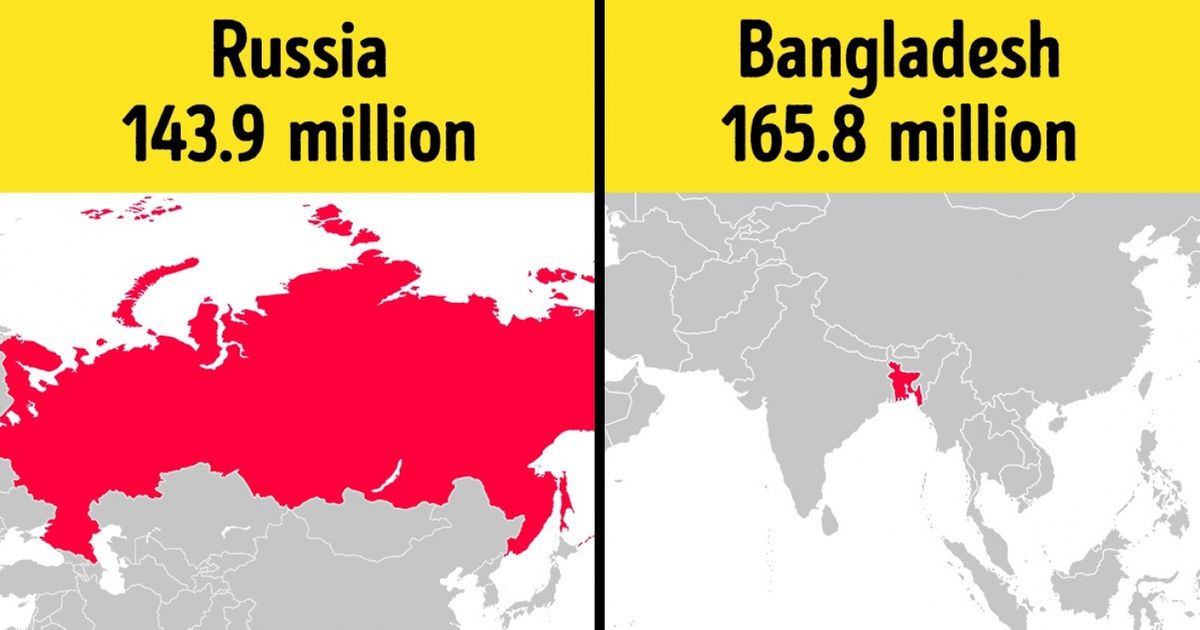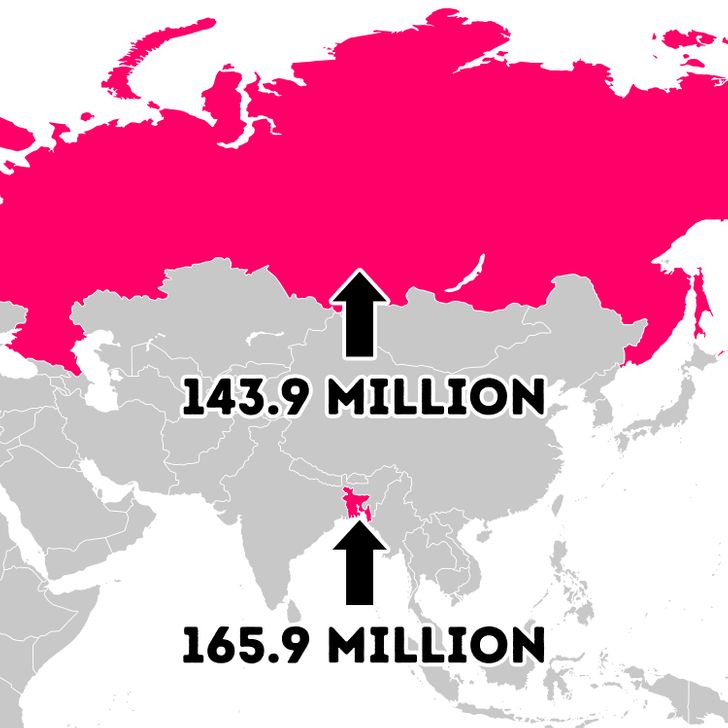"Scientists have learned on which day of the week more children are born. Thursday comes in first at 12.8%"
Who made the statistics?! if there are 7 days and the birth distribution was equally, it must be 1/7 or ~14.3%. therefor, Thursday can't be the first with 12.8%! it must be higher than 14.3%!!!
Finally, the link added shows that the first is Friday with more than twice probability compare to the other days.
13 Statistical World Facts That Even Those Who Hate Numbers Find Interesting

What do you do when you see a lot of numbers, charts and the word, “statistics”? You very well may ignore them. But not today! We’ve collected some of the most interesting statistical facts that reveal a lot about the world around us. For example, did you know that around 1,700 people in the U.S. become millionaires every day?
Bright Side is sharing the most interesting facts about the things that happen right here on our planet.
1.Bangladesh has a bigger population than Russia.
According to today’s data, the population of the small country, Bangladesh is bigger than the population of Russia. There are 20 million more people in Bangladesh even though the area of the country is 116,000 times smaller than that of Russia.
2. There are far less stars than trees.
According to statistics, there are more trees on Earth than there are stars in the Milky Way. Today, there are around 3 trillion trees and 400 billion stars.
3. Germany’s population has the lowest percentage of children.
4. Mary and James are the most popular names.
From the years 1917 to 2016, the most popular names were James for boys and Mary for girls. Among the boys, there were almost 5 million children named James, and 3.5 million girls named Mary. And interestingly enough, the name Justin was not very popular during this time period: it placed as number 38 on the list of names with 769,098 people having it.
5. The People’s Republic of China is known as, “The Golden Republic”.
6. For the past thousand years, Earth’s population has grown 22 times bigger.
The population of Earth has grown more than 22 times from the year 1000 to 2000. In July of the year 1000, there were 275,000,000 people; and in July of the year 2000, there were 6,145,006,989 people.
7. You can walk around Earth 4.5 times during your life.
On average, a person makes 7,500 steps a day with an average life expectancy of 80 years. Using this data, scientists calculated that a person can walk 180,000 kilometers during their lifetime. This means that in your life, you can walk around the equator 4.5 times.
8. In the U.S., people watch TV over 4 hours a day.
Every day, people in the U.S. spend 1/5 of their time (270 minutes) watching television. Just after America comes Poland, where people watch TV for 264 minutes.
9. The smallest number of children are born on Saturdays.
Scientists have learned on which day of the week more children are born. Thursday comes in first at 12.8%, followed by Monday at 11%. The least popular day to be born on is Saturday at 10%.
10. 90% of letters are spam.

According to Cisco, 90% of all e-mails are spam letters.
11. Danish women are the most hardworking mothers.
According to statistics, 82% of mothers in Denmark work regularly. Sweden, the Netherlands, and Slovenia don’t come far after Denmark. Greece comes in at last place — less than 50% of mothers work in this country.
12. McDonald’s sells 75 burgers per second.
One of the most popular fast food restaurants, McDonald’s sells around 75 burgers a second. They even have a special website which can help you track how many products have been sold and how many clients have been served.
13. In the U.S., 1,700 people become millionaires every day.
There are many more millionaires in the world than you might think. In the U.S., 1,700 people become millionaires every day. According to statistics, in the U.S., there are more than 8 million families whose yearly income is more than $1 million — and this number doesn’t include any property or jewelry.
How do these statistics make you feel? Which of these facts amazed you the most?
Comments
And the Bangladesh - Russia think wasn't surprising at all - Bangladesh has a very high population while Russia's is very low again.
i was born on saturday
"Greece comes in at last place — less than 50% of mothers work in this country." Great job insulting hard-working mums all around the world.
The first one REALLY surprised me
Related Reads
My Parents Refused to Support Me Through Med School—Then I Discovered Their Sad Secret

I Refuse to Let My FIL Near My Child, His Influence Is Toxic

I Refuse to Give My Retirement Savings to My Adult Son—I’m Not Responsible for His Failures

I Walked Out of the Family Reunion After My Stepdaughter Handed Me a List of “Rules”

I Refuse to Let My Stepson Disrespect Me, His Arrogance Cost Him Big

I Refused to Let My Sister Make My Wedding About Her Miscarriage—So I Exposed Her Dark Secret

18 Seniors Whose Sharp Wit Proves Humor Only Gets Better With Age

My Daughter Refused to Support Me—Despite Everything I Had Given Her

18 Stories That Prove Kindness Can Come From the Most Unexpected Places

15 Stories That Prove a Small Spark of Kindness Can Light Up a Fading Soul

I Refused to Let My Stepmother Dictate My Wedding—I Have Been Too Kind

I Refused to Follow My Mom’s “Different Beds” Rule—And the Real Reason Was Heartbreaking












